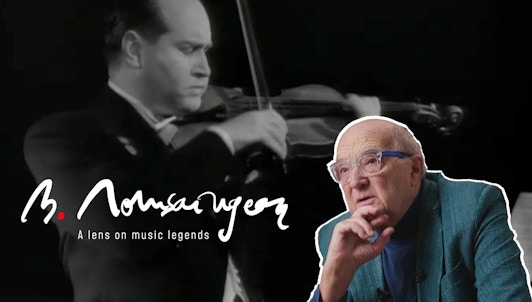Between violinist and conductor, a close friendship had developed over the years; Gennady Rozhdestvensky had directed David Oistrakh many times, and he had only wonderful memories of the moments spent onstage with "King David."
It was love at first sight for David, the child, when he saw his first violin, a toy his father gave him at age three. The little prince was born in Odessa in 1908 and began his violin studies with Piotr Stoliarski, who also taught Nathan Milstein and later Oistrakh's own son Igor. In 1937 he won the First Prize at the Eugène Ysaÿe Competition in Belgium.
Thus launched a splendid career which saw Oistrakh confined to the USSR for some time, authorized to travel abroad only after the death of Stalin. Oistrakh, like his friend Shostakovich, would remain his entire life in Russia—yet word of his genius traveled beyond the borders, making him a legend in his own right in the West.
Here we see him filmed at the Tchaikovsky Hall in Moscow on three occasions in the 1960s, accompanied by Rozhdestvensky. To begin, he tackles a major canonical work: the monumental violin concerto by Brahms, to which he brings all his remarkable gifts, seeming to reconcile the irreconcilable: Dionysian and Apollonian, firmly grounded yet light as air, virtuosic but not showy.
A few months later, in the same concert hall, Oistrakh performed the heart-stopping Sibelius Violin Concerto with the Radio-Symphonic Orchestra. As an encore, Oistrakh, instead of performing a technically dazzling showpiece, joined the whole orchestra in Beethoven's Romance in G Major, op. 40, expressing the infinite poetry in every note.
Lastly, a surprise, Rozhdestvensky's gift to mark the sixtieth birthday of his friend Oistrakh: an orchestration especially made for him of the 23rd Caprice from Locatelli's op. 3, titled Il Labirinto armonico. In the master's hands, grace incarnate.

